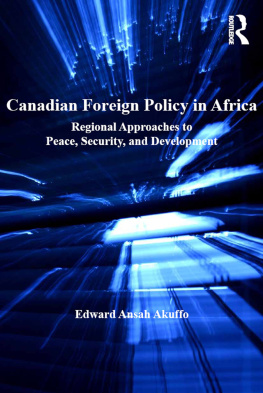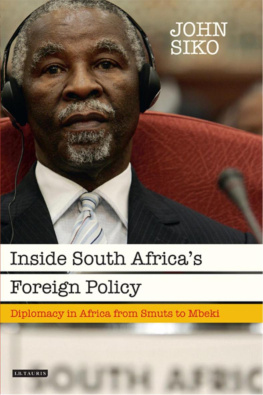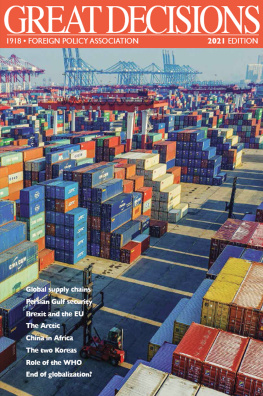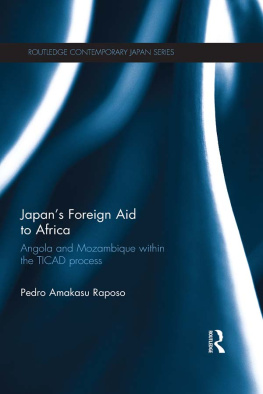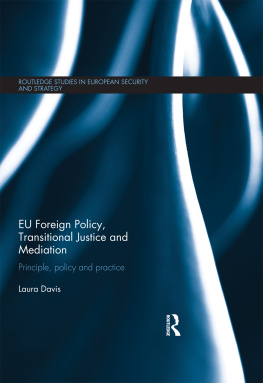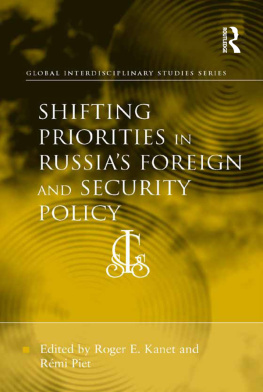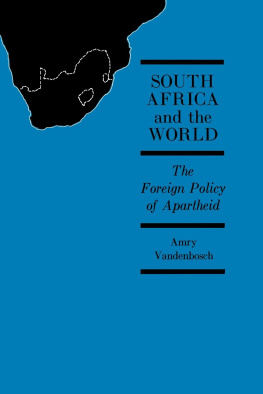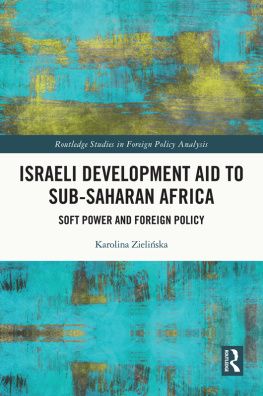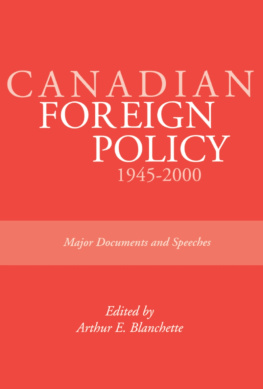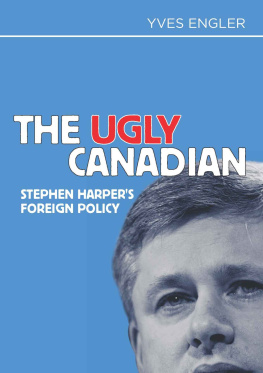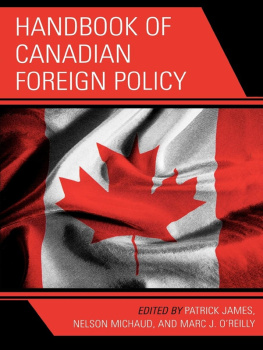CANADIAN FOREIGN POLICY IN AFRICA
Global Security in a Changing World
Series Editor: Professor Nana K. Poku, John Ferguson Professor,
Department of Peace Studies, University of Bradford, UK
Globalisation is changing the world dramatically, and a very public debate is taking place about the form, extent and significance of these changes. At the centre of this debate lie conflicting claims about the forces and processes shaping security. As a result, notions of inequality, poverty and the cultural realm of identity politics have all surfaced alongside terrorism, environmental changes and bio-medical weapons as essential features of the contemporary global political landscape. In this sense, the debate on globalisation calls for a fundamental shift from a status quo political reality to one that dislodges states as the primary referent, and instead sees states as a means and not the end to various security issues, ranging from individual security to international terrorism. More importantly, centred at the cognitive stage of thought, it is also a move towards conceiving the concept of insecurity in terms of change.
The series attempts to address this imbalance by encouraging a robust and multi-disciplinary assessment of the asymmetrical nature of globalisation. Scholarship is sought from areas such as: global governance, poverty and insecurity, development, civil society, religion, terrorism and globalisation.
Other titles in this series:
Post-conflict Disarmament, Demobilization and Reintegration
Bringing State-building Back In
Edited by Antonio Giustozzi
ISBN 978-1-4094-3738-3
Victims as Security Threats
Refugee Impact on Host State Security in Africa
Edward Mogire
ISBN 978-0-7546-7820-5
Africas New Peace and Security Architecture
Promoting Norms, Institutionalizing Solutions
Edited by Ulf Engel and J. Gomes Porto
ISBN 978-0-7546-7605-8 (hbk)
ISBN 978-0-7546-7606-5 (pbk)
Foreign Interventions in Ethnic Conflicts
Robert Nalbandov
ISBN 978-0-7546-7862-5
Canadian Foreign Policy in Africa
Regional Approaches to Peace, Security, and Development
EDWARD ANSAH AKUFFO
University of the Fraser Valley, Canada
First published 2012 by Ashgate Publishing
Published 2016 by Routledge
2 Park Square, Milton Park, Abingdon, Oxon OX14 4RN
711 Third Avenue, New York, NY 10017, USA
Routledge is an imprint of the Taylor & Francis Group, an informa business
Copyright 2012 Edward Ansah Akuffo
Edward Ansah Akuffo has asserted his right under the Copyright, Designs and Patents Act, 1988, to be identified as the author of this work.
All rights reserved. No part of this book may be reprinted or reproduced or utilised in any form or by any electronic, mechanical, or other means, now known or hereafter invented, including photocopying and recording, or in any information storage or retrieval system, without permission in writing from the publishers.
Notice:
Product or corporate names may be trademarks or registered trademarks, and are used only for identification and explanation without intent to infringe.
British Library Cataloguing in Publication Data
Akuffo, Edward Ansah.
Canadian foreign policy in Africa : regional approaches to peace, security, and development. -- (Global security in a changing world)
1. Canada--Foreign relations--Africa. 2. Africa--Foreign relations--Canada. 3. National security--Africa. 4. Human rights--Africa. 5. Peace-building, Canadian--Africa. 6. Economic assistance, Canadian--Africa. 7. New Partnership for Africas Development. 8. African Union. 9. Economic Community of West African States. 10. African cooperation.
I. Title II. Series
327.7'106-dc23
Library of Congress Cataloging-in-Publication Data
Akuffo, Edward Ansah.
Canadian foreign policy in Africa : regional approaches to peace, security, and development / by Edward Ansah Akuffo.
p. cm. -- (Global security in a changing world)
Includes bibliographical references and index.
ISBN 978-1-4094-3452-8 (hbk.)
1. Canada--Foreign relations--Africa. 2. Africa--Foreign relations--Canada. 3. Human security--Africa. 4. Peace-building--Africa.
I. Title.
JZ1515.A56A58 2012
327.7106--dc23
2011049788
ISBN 9781409434528 (hbk)
ISBN 9781315570785 (ebk)
Contents
Preface
This book contributes to the debate on Canadas approach to regional peace, security, and development in Africa. Observers of international history in Africa would agree that the development of African states and peoples has been affected by at least four important historical moments: colonialism, the struggle for independence, the Cold War, and Globalisation. Like all social relations, these historical epochs are not exclusive as they are very well interconnected by dominant ideas and practices, especially the great powers quest for power, resources, and influence by establishing partial or absolute control over territories in Africa. Yet, middle powers like Canada have had their own historical relationship with African states and peoples that helps to understand Canadas contemporary policy initiatives on the continent. The primary instruments of engagement used by Canada in Africa include development assistance, trade and investment, military aid, peacekeeping and, more recently, support for democratic and constitutional reform.
Since the colonial period, African states have occupied a weaker position in the international system. On their own, states in Africa lack the capabilities to exert their influence and pursue their national and regional interest. However, the transformation of hitherto weaker regional organisations such as the Organisation of African Unity into the African Union, and the introduction of new programmes such as the New Partnership for Africas Development (NEPAD) for the promotion of peace, security and development are changing the dynamics of African politics and the continents relationship with the outside world. Indeed, Africa is changing through a new configuration of power at the regional and sub-regional levels. This arguably is (re)positioning the African continent as an important partner in the comity of states. Within this context, great power influence in Africa has received much attention from scholars and observers of African politics and much less has been said about the role of middle powers in the making and breaking of African peace, (human) security and (human) development efforts. Against this background, as a middle power, Canadas place and role in Africa is an important and interesting one that deserves greater attention than it has been accorded.
The book does not seek to unravel the details of Canadas relationship in African states since colonialism as this could not be documented in a single book. Yet, it captures some of Canadas engagements in the four historical moments identified above, while focusing primarily on contemporary Canadian government policy in Africa after the ending of the Cold War and the onset of globalisation. More specifically, it critically examines a shift in Canadas foreign policy towards regional organisations other than states in Africa. This is an important development that characterised Canadas engagement in Africa under the Liberal governments of Prime Ministers Jean Chrtien and Paul Martin, and to some extent the Conservative government of Prime Minister Stephen Harper. Canadas response to the NEPAD under the Liberal government of Jean Chrtien came in the form of a $500 million Canada fund for Africa (CFA) that among other things supported the capacity building of African Peace and Security Architecture (APSA) and the ECOWAS Security Mechanism. The promotion of human security played a key role in Canadas approach to the AU and ECOWAS peace and security capacity building.

